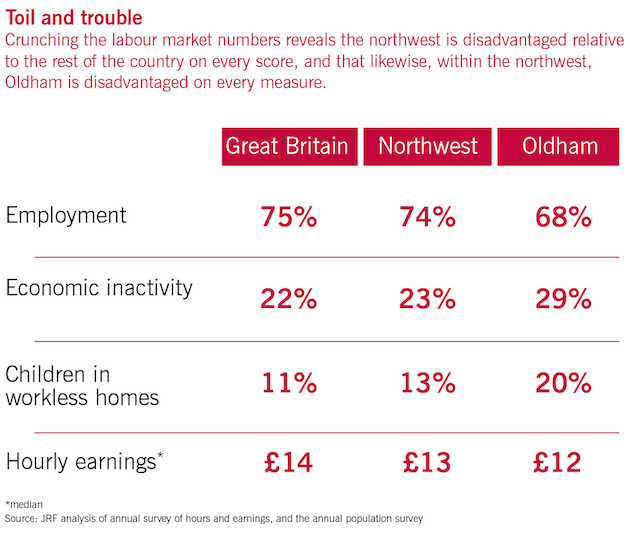It is simply not acceptable that there are parts of the UK that have been locked out of opportunity for so long. The lack of vibrancy in some towns and cities contributed to the vote to leave the EU, with many citizens just wanting to see a change, any change, that might help to improve the prospects in their local area.
In the workshops we held with The UK in a Changing Europe, we detected a real sense of frustration from low-income voters with the dominance of London and the surrounding area in our economic and political life. This wasn’t a view expressed just in the north either; voters in Southampton and Hastings identified the same problem.
Those seeking to lead our country need to sit up and listen. Low-income voters form an increasingly significant part of the electorate. Not only are they turning out in greater numbers, but new research by Matthew Goodwin for JRF shows this is the group most likely to switch parties.
We heard differences of view between participants from larger cities and those from smaller towns, and over Brexit and its likely impact on the local economy. But while Brexit is important, for most participants the need for government action on living standards drives their voting choices. The party that develops a policy agenda that responds to these concerns could reap real electoral rewards.
But what could that agenda look like? A common vision emerged from those we heard from, one which bridged the divide. The workshops were split evenly between Leave and Remain voters and when speaking about issues beyond Brexit there was real consensus about the challenges facing their local areas. They wanted to see prosperity unlocked across the country to rebalance the economy, make sure work pays, and ensure people have the skills to make the most of opportunities in their area.
"This is the perfect moment to find common ground”With all political parties talking about loosening the purse strings, giving people and places the tools to thrive is essential. An immediate step the government could take is to get on and deliver the promised UK Shared Prosperity Fund to reduce inequalities between communities. This should target regions where pay and employment are lowest and at least match the £2.4bn a year that currently flows from the EU Structural Funds it will replace.
But action cannot stop there; much greater ambition is needed if we are to spread opportunity outside London and its orbit. The UK 2070 Commission recently called for a national “Renewal Fund,” £10bn per year investment above and beyond existing spending commitments, for the next 25 years. But this can’t be about choosing between towns andcities—their fortunes are interconnected. What matters is giving places the power to prosper.
The low-income voters we heard from wanted to see action on the minimum wage to ensure it covers the ever-increasing cost of living—currently being discussed by Labour and the Conservatives—but they also raised concerns about job insecurity too. Stronger local public transport systems and more generous childcare offerings, especially for people with younger children, were interventions that people thought could really help.
Among those we met, the provision of high quality apprenticeships and support for adults to retrain were recurrent themes. However, the changes made to the apprenticeships system in 2017 have resulted in a worrying decline in uptake among lower skilled people, and significant cuts to adult skills budgets in recent years have coincided with plummeting participation in adult training. The recent Augar Review suggested ways that the system could be improved, with more funding, simpler access, and more financial support for those on low incomes, while driving up the quality of non-degree qualifications. Political parties should embrace these recommendations.
At a time when the country is so profoundly divided over Brexit, this is the perfect moment to find common ground and push forward with an agenda that can unite people. Too much emphasis has been placed on how to appeal to Leave or Remain voters as separate groups, and far too little on how to bridge that divide. Participants in our focus groups told us what the priorities should be: improving living standards and restoring pride to towns and cities which for too long have been overlooked.

This article features in “All about towns,” Prospect’s new report in partnership with the Joseph Rowntree Foundation












